Calibration is the set of operations with which, under certain specific conditions, the correspondence between the values indicated in an instrument, equipment or measurement system, or by the values represented by a materialized measure or reference material, and the known values corresponding to a magnitude of measurement or standard, thus ensuring the traceability of the measurements to the corresponding basic units and proceeding to their adjustment or expressing this correspondence by means of tables or correction curves.
In order to calibrate an instrument or standard it is necessary to have one of greater precision that provides the conventionally true value that will be used to compare it with the indication of the instrument undergoing calibration.
Why is it important to calibrate?
The aging of the components, the temperature changes and the mechanical stress that support the equipment gradually deteriorate their functions. When this happens, tests and measurements begin to lose confidence and are reflected in both the design and the quality of the product. These types of situations can be avoided, through the calibration process.
The correct calibration of the equipment provides the assurance that the products or services offered meet the required specifications. The reasons that lead manufacturers to calibrate their measuring equipment are increasingly numerous, in order to:
- Maintain and verify the proper functioning of the equipment.
- Respond to the requirements established in the quality standards.
- Ensure the reliability and traceability of the measures.
What is preventive maintenance?
On the other hand, it is known as planned preventive maintenance to schedule inspections in operation, safety, adjustments, repairs, analysis, cleaning, lubrication, calibration, which must be carried out periodically based on an established plan and not a demand of the operator or user.
The main purpose of preventive maintenance is to inspect equipment and detect faults in their initial phase, correcting them in a timely manner.
Advantages of preventive maintenance
- Reliability, the equipment operates in better safety conditions, since its status is known, and its operating conditions.
- Reduction of downtime, equipment / machine downtime.
- Longer duration of equipment and facilities.
- Reduction of stock in warehouse and, therefore, its costs, since the spare parts of higher and lower consumption are adjusted.
- Workload uniformity for maintenance personnel due to a schedule of activities.
- Lower cost of repairs.
In all industries the cost reduction is important since this will be reflected in the increase in profits, this decrease must be carried out without compromising the quality of the final product since during the production process it is important that each part is performed with quality to obtain the desired results.
Why carry out calibration and preventive maintenance by a single supplier?
When a company has a preventive maintenance service provider and another for the calibration and adjustment of equipment and instruments, problems of incompatibility of procedures applied to the equipment usually occur, in addition to the maintenance service guarantees being lost when they are Revised the instrument by another provider, this is one of the most important reasons for both services to be given by the same company, since the guarantee is still retained, in addition to having the contact that will carry out the service well identified, saving Search time for two suppliers, which saves money, which will result in higher profits.
In Kalstein we offer equipment with a high level of technology and precision that will allow you to obtain much more reliable results in your laboratory. That’s why we invite you to take a look in our product catalog at HERE

